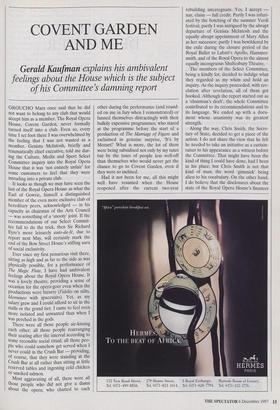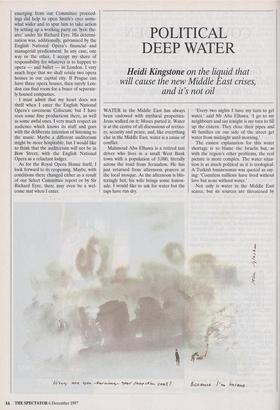COVENT GARDEN AND ME
Gerald Kaufman explains his ambivalent
feelings about the House which is the subject of his Committee's damning report
GROUCHO Marx once said that he did not want to belong to any club that would accept him as a member. The Royal Opera House, Covent Garden, never formally turned itself into a club. Even so, every time I set foot there I was overwhelmed by the feeling that I was not wanted as a member. Genista McIntosh, briefly and traumatically chief executive, told me dur- ing the Culture, Media and Sport Select Committee inquiry into the Royal Opera House that it was 'not entirely unfair' for some customers to feel that they were intruding into a private club. It looks as though we may have seen the last of the Royal Opera House as what the Earl of Gowrie, himself a distinguished member of the even more exclusive club of hereditary peers, acknowledged — in his capacity as chairman of the Arts Council — was something of a 'snooty' joint. If the recommendations of our Select Commit- tee fail to do the trick, then Sir Richard Eyre's more leisurely auto-dale, due to report next May, will certainly mark the end of the Bow Street House's stifling aura of social exclusivity. Ever since my first penurious visit there, sitting as high and as far to the side as was physically possible, for a performance of The Magic Flute, I have had ambivalent feelings about the Royal Opera House. It was a lovely theatre, providing a sense of occasion for the opera-goer even when the productions were bizarre (Fidelio on stilts, Idomeneo with spacesuits). Yet, as my salary grew and I could afford to sit in the stalls or the grand tier, I came to feel even more isolated and unwanted than when I was perched in the gods. There were all those people air-kissing each other; all those people rearranging their seating after the interval according to some recondite social ritual; all those peo- ple who could somehow get served when I never could in the Crush Bar — providing, of course, that they were standing at the Crush Bar at all rather than sitting at little reserved tables and ingesting cold chicken or smoked salmon.
Most aggravating of all, there were all those people who did not give a damn about the opera; who chatted to each other during the performance (and round- ed on me in fury when I remonstrated) or fanned themselves distractingly with their bulkily expensive programmes; who stared at the programme before the start of a production of The Marriage of Figaro and exclaimed in genuine surprise, 'It's by Mozart!' What is more, the lot of them were being subsidised not only by my taxes but by the taxes of people less well-off than themselves who would never get the chance to go to Covent Garden, even if they were so inclined.
Had it not been for me, all this might well have resumed when the House reopened after the current two-year rebuilding interregnum. Yes, I accept nay, claim — full credit. Partly I was infuri- ated by the botching of the summer Verdi festival; partly I was intrigued by the abrupt departure of Genista McIntosh and the equally abrupt appointment of Mary Allen as her successor; partly I was bewildered by the exile during the closure period of the Royal Ballet to Labatt's Apollo, Hammer- smith, and of the Royal Opera to the almost equally incongruous Shaftesbury Theatre.
The members of the Select Committee, being a kindly lot, decided to indulge what they regarded as my whim and hold an inquiry. As the inquiry proceeded, with rev- elation after revelation, all of them got hooked. Although the report started out as a 'chairman's draft', the whole Committee contributed to its recommendations and to its language. We ended up with a docu- ment whose unanimity was its greatest strength.
Along the way, Chris Smith, the Secre- tary of State, decided to get a piece of the action. I do not share the view that he felt he needed to take an initiative as a curtain- raiser to his appearance as a witness before the Committee. That might have been the kind of thing I could have done, had I been in his place; but Chris Smith is not that kind of man, the word 'gimmick' being alien to his vocabulary. On the other hand, I do believe that the disclosures about the state of the Royal Opera House's finances emerging from our Committee proceed- ings did help to open Smith's eyes some- what wider and to spur him to take action by setting up a working party on 'lyric the- atre' under Sir Richard Eyre. His determi- nation was, additionally, galvanised by the English National Opera's financial and managerial predicament. In any case, one way or the other, I accept my share of responsibility for whatever is to happen to opera — and ballet — in London. I very much hope that we shall retain two opera houses in our capital city. If Prague can have three opera houses, then surely Lon- don can find room for a brace of separate- ly housed companies.
I must admit that my heart does not thrill when I enter the English National Opera's cavernous Coliseum; but I have seen some fine productions there, as well as some awful ones. I very much respect an audience which knows its stuff and goes with the deliberate intention of listening to the music. Maybe a different auditorium might be more hospitable, but I would like to think that the auditorium will not be in Bow Street, with the English National Opera as a reluctant lodger.
As for the Royal Opera House itself, I look forward to its reopening. Maybe, with conditions there changed either as a result of our Select Committee report or by Sir Richard Eyre, there may even be a wel- come mat when I enter.



















































































 Previous page
Previous page